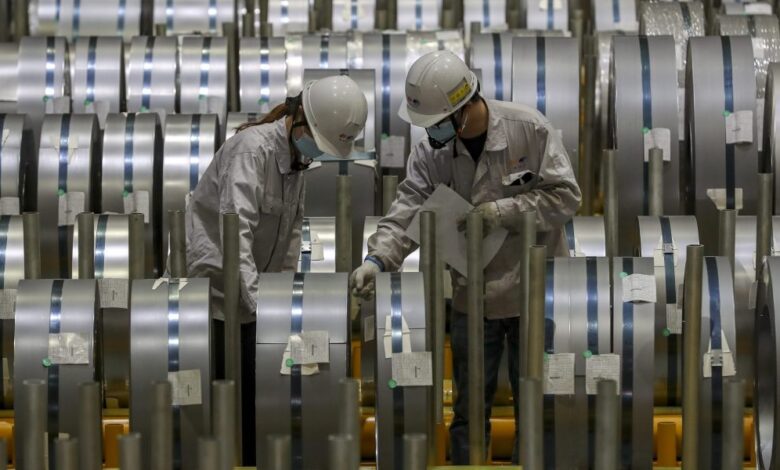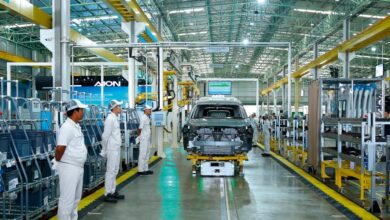China Economy: Japanese Companies Are Pulling Out


Japanese companies are increasingly abandoning an approach to doing business in China that once seemed immune to politics, a marked change after years when they were the largest single investor in their neighbor’s economy.
In an era of geopolitical risks and concerns about slowing Chinese growth, the economic math is no longer viable for Nippon Steel Corp., which announced in July that it would pull out of its joint venture in China. Mitsubishi Motors Corp. suspended local operations indefinitely last year, citing falling auto sales and China’s rapid shift to electric vehicles.
Nearly half of Japanese companies in China surveyed in a recent survey survey said they would not spend more or would cut back on investment this year. Companies listed rising wages, falling prices and geopolitics as the biggest issues they faced.
“We have now passed the peak of economic cooperation between Japan and China,” he said. Robert WardDirector of Geoeconomics and Strategy at the International Institute for Strategic Studies in London.
Barriers from US-China technology competition to increase stress in the Taiwan Strait, according to Ward. “Geopolitics is a big factor” in changing attitudes, he said.
This slow-moving rift threatens an economic bond that dates back more than four decades, when Japan began extending trillions of yen in development aid to China through low interest loans. Trade and commerce are the pillars of the contentious relationship between the two Asian giants — summed up by academics with the catchphrase “business is hot, politics is cold.”
This time, the chill winds of geopolitics are proving difficult to stop.
New foreign direct investment is on track to stagnate near a multi-year low in 2023 after first-quarter volume fell to its lowest since 2016. It’s a turnaround for Japanese companies, which had amassed nearly $130 billion in FDI in China through the end of last year.
This is a change from previous periods of bilateral tensions, which did not have much of an impact on investment. Even during the 2010-2012 period, when the territorial dispute between the two sides heated up and Beijing temporarily blocked shipments of rare earths to Japan, companies increased their investment by an average of 13% per year.
China appears to be concerned about the decline and is trying to attract more investment from Japanese companies, according to a Tokyo official in charge of China policy, who asked not to be named discussing official matters.
The political landscape is also much less benign. Last month, a Chinese military aircraft violated Japanese airspace for the first time, an incident that was soon followed by a Chinese naval vessel entering Japanese territorial waters.
Furthermore, the welfare of Japanese people at home is also threatened.
ONE knife attack The case of a Japanese woman and her child in Suzhou, central China, in June — which the Chinese government called an “isolated” incident — has sparked concern among the Japanese community and increased security at schools nationwide. Japan is still asking authorities in Suzhou to provide details of the case, according to a statement from an embassy spokesperson.
The detention The arrest of a Japanese pharmaceutical executive early last year also raised public alarm about the safety of Japanese citizens in China. The man was indicted on espionage charges earlier this month.
Japanese companies are also caught up in broader geopolitical tensions, with the United States pressing Tokyo to tighten export restrictions on high-tech goods in the semiconductor sector, and China reportedly threatening retaliation if that happens.
Some Japanese companies are even talking about China as a threat rather than an opportunity. The head of one of the country’s largest trading companies has called on the government to provide support to help the country’s businesses compete in places like Southeast Asia, where Chinese companies like BYD Companies are rapidly entering the scene.
For Nippon Steel — one of the First Japanese investor into China — local businesses have become an obstacle for effort to buy U.S. Steel Corp., while politicians in the United States see it as a threat to national security.
Look Elsewhere
As the focus of Japanese companies shifts elsewhere in Asia and beyond, China’s economic woes are also taking much of the blame. Of the 1,760 companies in survey According to the Japanese Chamber of Commerce and Industry in China, 60% said the economy is worse now than last year.
China’s importance to Japanese exporters is not what it was in previous years, as companies adapt to US tariffs and other changes including encourage from Tokyo to move factories out of China.
China accounted for less than 18% of Japan’s exports last year — the lowest level since 2015 — with the value down nearly 7% compared with double-digit growth to the United States and the European Union. As a result, the United States surpassed China as Japan’s largest export market for the first time in four years.
Komatsu is a prime example. The maker of excavators and heavy equipment is selling far fewer units in China due to a slowing economy, a downturn in the construction industry and tougher competition.
While Komatsu’s China revenue from construction and mining equipment fell 57% last fiscal year from its peak in 2019, global revenue rose nearly 46% over the same period.
There were about 31,000 Japanese companies in China last year, down about a tenth from 2020, according to Japan’s Foreign Ministry. About 4,000 companies set up offices elsewhere in the world during the same period.
“Right now, companies are restructuring their businesses to stem losses,” said Masami Miyashita, director general of the Japan-China Economic Association in Beijing. “This is not the time to invest.”
At a recent conference in the Chinese port city of Qingdao aimed at attracting foreign companies, the mood was equally gloomy. None of the half-dozen senior Japanese executives interviewed by Bloomberg said they planned to expand investment, expressing little optimism about the economy this year or next.
However, not all Japanese companies have given up.
Panasonic Corporation The group has planned to invest more than 50 billion yen ($350 million) since early last year to build new home appliance factories, while Kobe Steel Tianjin Construction and Technology Co., Ltd. recently announced that it will establish a joint venture with a company in China.
But it will take more than that to mend economic ties.
Chinese companies have become more competitive and the geopolitical confrontation between the United States and China is making Japanese companies hesitant to invest in some areas, such as semiconductors and emerging technologies, according to Kazuto SuzukiProfessor of Global Political Economy at the University of Tokyo.
“Japanese companies do not see an immediate recovery in the Chinese economy, so it makes no sense to increase investment,” he said. “Other factors, such as geo-economic concerns and lack of transparency, will make it difficult to invest on the scale they have in the past.”
In our new special edition, a Wall Street legend gets a complete makeover, a story about the injustice of cryptocurrency, corrupt poultry royalty, and more.
Read the stories.




